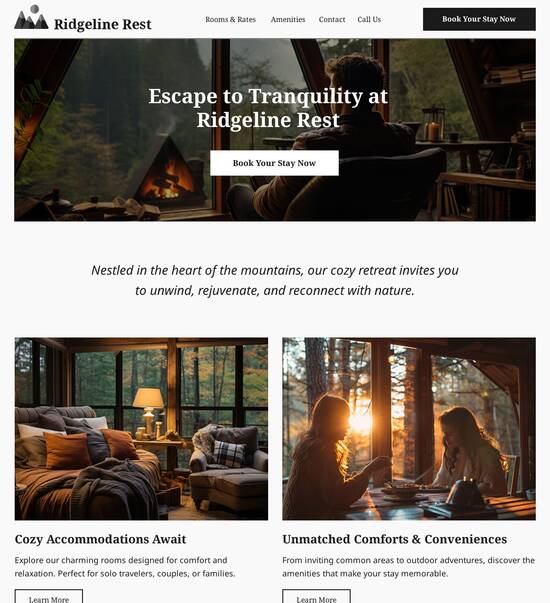
Microsite Template for Chemical Engineers
Explore Similar TemplatesAbout template
Create customized and effective microsites quickly with 500+ conversion-focused layouts and built-in optimization features. No coding required. Increase brand trust, customer loyalty, and conversion rates.
Recommended templates

Easy to build without coding
With the intuitive drag-and-drop builder, anyone on your team can create high-converting pages without any knowledge of code or design. Make enhancements to your landing page with custom widgets using Javascript, HTML/CSS, or third-party scripts.

Multiple layouts for any industry and goal
Select from 500+ landing page layouts built to boost conversions across industry-specific scenarios. Customize them by adjusting fonts, adding images, and generating on-brand content with the AI assistant. Quickly scale with Instablocks® and Global Blocks that you can save, reuse, and update globally.

Loads fast and looks polished on any device
Every template is responsive, which means they present professionally on any device and load blazingly fast with our Thor Render Engine. You can also power them up with Google AMP technology to deliver an unparalleled mobile experience and drive higher conversions.

Robust analytics & experimentation
Get real-time updates and reporting across all your devices, showing the number of visitors, conversions, cost-per-visitor, and cost-per-lead. Launch AI-powered experiments, run A/B tests, and use heatmaps to analyze user behavior, then optimize your landing page to maximize conversions.







Easy to build without coding
With the intuitive drag-and-drop builder, anyone on your team can create high-converting pages without any knowledge of code or design. Make enhancements to your landing page with custom widgets using Javascript, HTML/CSS, or third-party scripts.
Multiple layouts for any industry and goal
Select from 500+ landing page layouts built to boost conversions across industry-specific scenarios. Customize them by adjusting fonts, adding images, and generating on-brand content with the AI assistant. Quickly scale with Instablocks® and Global Blocks that you can save, reuse, and update globally.
Loads fast and looks polished on any device
Every template is responsive, which means they present professionally on any device and load blazingly fast with our Thor Render Engine.
Robust analytics & experimentation
Get real-time updates and reporting across all your devices, showing the number of visitors, conversions, cost-per-visitor, and cost-per-lead. Launch AI-powered experiments, run A/B tests, and use heatmaps to analyze user behavior, then optimize your landing page to maximize conversions.
All the features you need to build lead-generating landing pages
Explore more featuresLearn how to build top-performing landing pages for any goal
FAQs
Leading the way in building high-performing landing pages





A powerful landing page solution for marketing professionals
When it comes to digital marketing, landing pages play a critical role in converting visitors into leads. Instapage's comprehensive landing page and conversion rate optimization (CRO) platform empowers marketers to create high-impact landing pages effortlessly, ensuring a significant boost in their campaigns' performance.
Understanding the importance of landing pages
Landing pages are standalone web pages specifically designed for marketing or advertising campaigns. They are highly focused and aim to drive the visitor's action towards a specific goal. By leveraging Instapage’s unique templates and intuitive builders, marketers can quickly create professional-looking pages without needing coding skills. High conversions are achievable with conversion-focused designs and strategically placed lead generation elements.
- Improved Conversion Rates: Instapage's optimized templates can significantly improve your conversion rates by simplifying user journeys.
- Customization Options: Personalizing your landing pages according to your brand voice is easy with customizable elements.
- A/B Testing Capabilities: You can test different versions of your landing pages to determine which one performs better, ensuring you collect valuable insights.
- Analytics Integration: With analytics, you can track the performance of your landing pages and adjust your strategies accordingly.
How to create a successful landing page with Instapage
Creating a high-converting landing page involves several key steps:
Step 1: Utilize ready-made templates
Start by choosing from over 100 high-conversion templates specifically tailored to various industries. Select a template that aligns with your campaign goals.
- Targeted Designs: Utilize industry-specific designs to ensure relevance to your audience.
- Mobile Responsiveness: Choose templates that automatically adapt to mobile devices, enhancing user experience.
- Lead Capturing Forms: Incorporate forms that are strategically placed to capture leads effectively.
Step 2: Optimize with advanced features
Once your template is selected, you can use Instapage's optimization tools:
- Heatmaps: These help you visualize how users interact with your page, allowing you to adjust elements for better performance.
- A/B Testing: Create variations of your landing page and analyze which version drives more conversions.
- Dynamic Text Replacement: Tailor your messaging for specific audience segments for improved relevancy.
By following these steps, you create dedicated landing pages that drive measurable results.
Make the most out of your marketing strategies today! Start utilizing Instapage to supercharge your landing pages and see the difference it makes in your conversion rates.
Microsite template for chemical engineers: Innovations in digital presence
The significance of tailored microsites for chemical engineering professionals
Microsites have emerged as critical tools in the chemical engineering landscape, enabling professionals to showcase their expertise and services in a distinct digital space. By definition, a microsite is a small, focused website, often separate from the main company website, that serves specialized content for specific audiences. In chemical engineering, where complexity and specificity are paramount, a tailored microsite can bridge the gap between technical content and effective communication strategies. These platforms allow engineers and firms to engage with diverse stakeholders, from clients looking for innovative solutions to researchers sharing findings.
The need for specialized digital engagement platforms grows as the industry evolves. Chemical engineers must navigate evolving technologies, compliance requirements, and industry standards. A well-designed microsite not only communicates core services but also provides a space for thought leadership, research dissemination, and collaboration opportunities. Noteworthy case studies highlight how companies utilizing microsites have improved their online presence and audience interaction. For example, a company promoting a new catalyst technology saw a 40% increase in lead generation after launching a focused microsite.
Features of microsite templates: Crafting custom experiences
Effective microsite templates are designed with specific features that address the unique needs of chemical engineers. One critical component is built-in HTML templates, which allow for easy customization without extensive programming skills. These templates can accommodate various content types, including technical schematics, white papers, and multimedia resources. A compelling HTML microsite template ensures that essential elements like navigation, visuals, and calls-to-action are integrated seamlessly, enhancing user experience.
Key elements of a successful HTML microsite include clean design, responsive layouts, and accessible content. For instance, a template showcasing a new chemical process might feature clear graphics and intuitive navigation to simplify complex information. Examples of effective designs can be seen in successful chemical engineering firms that have leveraged microsites to present their innovations and expertise. Such designs not only attract visitors but also keep them engaged with interactive features tailored to their technical interests.
Customizable user interface for easy modifications.
Integration of multimedia elements such as videos and animations.
Provision for downloadable resources like presentations and infographics.
Specific capabilities of microsite templates
Microsite templates offer specific capabilities that empower chemical engineering professionals to present their services effectively. For instance, the ability to showcase products and services efficiently is crucial in a technical field where clarity matters. A well-organized microsite can highlight areas like research and development projects or production services with engaging layouts that attract attention and drive inquiries. Additionally, providing downloadable resources like white papers and case studies can establish authority and facilitate connections with potential clients.
Another vital capability involves data collection and analytics. Microsites can integrate forms for visitors to download resources or sign up for newsletters, helping capture leads and insights. Moreover, utilizing cookies on these sites can personalize user experiences based on previous interactions, leading to more targeted marketing strategies. By understanding user behavior through analytics, engineers can refine their offerings and enhance user engagement.
Benefits of using microsite templates in chemical engineering
Employing microsite templates in the chemical engineering sector brings numerous benefits, both operationally and financially. One of the principal advantages is cost-effectiveness. Compared to traditional marketing techniques that may require hefty budgets, developing a microsite can be a more economical way for small and medium-sized enterprises (SMEs) to enhance their market visibility. Companies can leverage free or low-cost hosting solutions and use open-source templates to maximize their return on investment without the need for extensive financial resources.
Furthermore, enhanced audience engagement is a significant benefit of microsites. These platforms enable engineers to tailor content specifically for their target demographics, including professionals, researchers, and academic institutions. By utilizing strategic content tailored to these unique groups, companies can foster greater interaction on published content, ultimately facilitating dialogue and partnerships. Examples of strategies for increasing interactions include hosting webinars, conducting polls, and offering relevant industry updates.
Practical applications of microsite templates in the field
Microsite templates find practical applications across various functions within the chemical engineering field. Promoting research and development initiatives via dedicated microsites allows companies to share groundbreaking findings effectively. Integrating multimedia elements such as videos and infographics can simplify complex concepts, making them more accessible to wider audiences, including non-technical stakeholders. Presenting R&D activities on a microsite also encourages transparency and attracts investment opportunities.
Highlighting innovations in areas such as oil and gas production is another significant use of microsite templates. Effective layouts that showcase these advancements can engage site visitors by illustrating the potential impacts and benefits of new technologies. Companies can adopt gamification techniques to make the learning experience enjoyable while keeping the technical aspects front and center. Engaging potential clients or collaborators through interactive features or competitions can lead to deeper interest in innovative solutions within the industry.
Challenges and considerations in microsite development
Despite their numerous benefits, developing microsites does present certain challenges. One significant hurdle is technical limitations, particularly when addressing compatibility issues across diverse web browsers or devices. Ensuring responsive design is vital because users may access content across varied platforms, including desktops, tablets, and smartphones. Neglecting this aspect could lead to poor user experiences, reducing engagement and undermining the microsite’s purpose.
Moreover, user adoption and feedback loops pose additional challenges in maximizing the effectiveness of microsites. Encouraging user feedback can be daunting, yet it is crucial for continuous improvement. Implementing user surveys or feedback functionality can help gather insights into which aspects of the microsite resonate best. Regularly utilizing analytics data to track user engagement and modify the microsite based on these findings forms the cornerstone for iterative improvements that keep both content and design fresh and relevant.
Success stories: Case studies of effective microsite implementations
Examining success stories provides valuable insights into the real-world impact of microsite templates. For instance, Company A focused on driving innovation in gas production through a dedicated microsite designed specifically for gas engineering solutions. This strategic move allowed them to highlight their technological advancements and engage potential clients effectively. Measurable outcomes included significant increases in user engagement metrics, lead generation, and expanded visibility within industry networks.
Another noteworthy example is Company B, which pioneered research in chemical processes. They transformed their research dissemination with a dedicated microsite that featured empirical resources accessible to researchers and industry professionals. The availability of downloadable resources such as research publications and white papers on the microsite not only attracted serious researchers but also facilitated partnerships with academic institutions. This approach underscored the significant role microsites play in enhancing visibility and collaboration in specialized fields.
The future of microsites for chemical engineers
As technology continues to advance, the future of microsites for chemical engineers looks promising. Emerging technologies like artificial intelligence (AI) and machine learning are anticipated to enhance microsite functionalities, allowing for more personalized content delivery and user experiences. For instance, AI-driven analytics could provide insights into user preferences and behaviors, enabling chemical engineering firms to tailor their content even further. Additionally, exploring augmented reality (AR) and virtual reality (VR) applications in educational microsites could revolutionize how engineers engage with technical content and training.
The role of community and networking is also evolving within the microsite space. Interactive microsites can facilitate professional networking opportunities, encouraging collaboration among chemical engineers, researchers, and academic institutions. By fostering communities around specific topics or innovations, microsites can significantly enhance knowledge sharing and drive industry advancements. The future of these platforms is focused not just on content delivery but on creating spaces that actively engage and connect professionals in meaningful ways.
Creating your own microsite template: Step-by-step guide
Creating a microsite template tailored for chemical engineering professionals begins with choosing the right platform. Evaluating options between custom builds and template-based solutions is essential, especially considering user-friendliness and desired outcomes. Platforms offering pre-designed templates are often beneficial, allowing engineers to launch quickly without needing extensive web development knowledge. Consider ensuring that the chosen platform supports customization, analytics, and scalability for future growth.
Designing for impact is the next crucial phase. Key design principles include ensuring clarity, maintaining a professional tone, and aligning visuals with the content. Essential elements such as calls-to-action, downloadable resources, and contact forms should be strategically integrated to encourage user interactions. Once the microsite is built, testing and iteration are vital steps. Ensuring functionality across multiple devices and conducting A/B testing can help optimize the user experience before the full launch.
User engagement strategies for enhanced value delivery
Incorporating feedback mechanisms into your microsite can significantly enhance its effectiveness. Tools such as user surveys, comment sections, and feedback forms are excellent ways to gather insights about user experiences. Collecting and analyzing this feedback enables continuous improvement of content and design features. Moreover, ensuring that users can easily share their thoughts fosters a sense of community and loyalty around your microsite.
Utilizing social proof is another valuable strategy towards building trust and credibility. Techniques like integrating testimonials from industry experts or showcasing votes and accolades received can enhance users' perception of your brand. Social proof acts as a powerful motivator, increasing the likelihood of new visitors engaging with your content or making inquiries. By continuously refining your microsite based on user feedback and showcasing positive experiences, you solidify your position as a trusted authority in the chemical engineering field.
Ready to skyrocket conversions?
Supercharge your ad campaigns with high-performing landing pages
Get started














